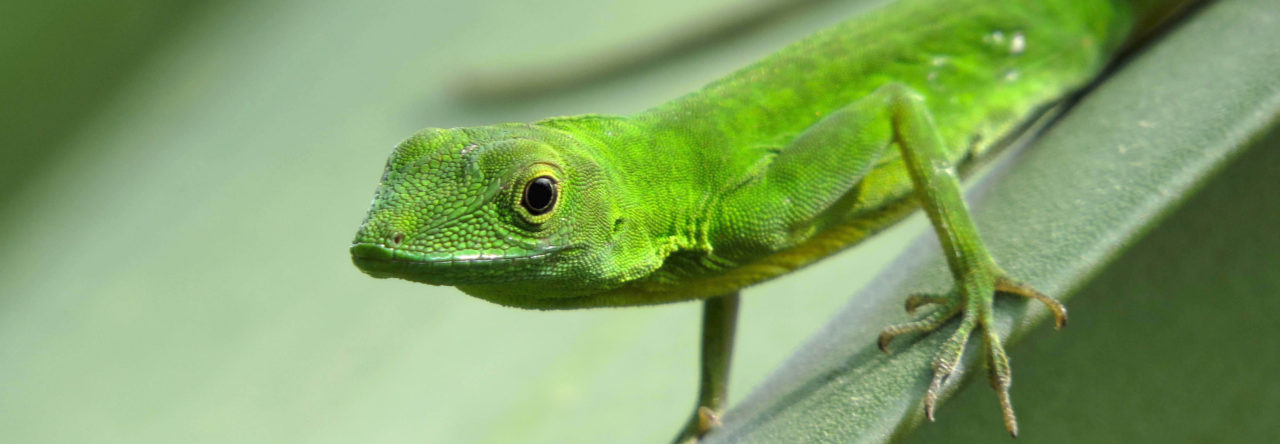When it rains, it pours. Research on the immense diversity in anole chromosomes was rampant in the 1970’s and early 1980’s, and then…nothing. Until, that is, the last two months. Not one, but two, papers appeared in Evolution, and now AA has learned of a paper on chromosomal variation in Norops clade anoles, recently published in Zoological Studies (click for a downloadable pdf). The paper, by Castiglia et al., examines karyotypes in Norops anoles and argues that karyological variation is in some cases consistent with our understanding of phylogenetic relationships within the group.
Abstract
Background: Neotropical lizards, genus Anolis (Polychrotidae), with nearly 380 species, are members of one of the most diversified genera among amniotes. Herein, we present an overview of chromosomal evolution in ‘beta’ Anolis (Norops group) as a baseline for future studies of the karyotypic evolution of anoles. We evaluated all available information concerning karyotypes of Norops, including original data on a recently described species, Anolis unilobatus. We used the phylogeny of Norops based on DNA sequence data to infer the main pattern of chromosomal evolution by means of an ancestral state analysis (ASR).
Results: We identified 11 different karyotypes, of which 9 in the species had so far been used in molecular studies. The ASR indicated that a change in the number of microchromosomes was the first evolutionary step, followed by an increase in chromosome numbers, likely due to centric fissions of macrochromosomes. The ASR also showed that in nine species, heteromorphic sex chromosomes most probably originated from six independent events.
Conclusions: We observed an overall good correspondence of some characteristics of karyotypes and species relationships. Moreover, the clade seems prone to sex chromosome diversification, and the origins of five of these heteromorphic sex chromosome variants seem to be recent as they appear at the tip nodes in the ancestral character reconstruction. Karyotypic diversification in Norops provides an opportunity to test the chromosomal speciation models and is expected to be useful in studying relationships among anole species and in identifying cryptic taxa.
- Evolution in Real Time on Lizard Island - March 23, 2025
- Spider Snags Adult Anolis osa - March 22, 2025
- An Homage to the Green Anoles of New Orleans - March 21, 2025



Thomas Sanger
For readers interested in this topic another paper recently popped up in a Pubmed search that you might be interested in. In this article anoles are just one of several taxa examined.
Cretaceous park of sex determination: sex chromosomes are conserved across iguanas.
Rovatsos M1, Pokorná M, Altmanová M, Kratochvíl LX. Biol Lett. 2014 Mar 5;10(3).
Abstract
Many poikilothermic vertebrate lineages, especially among amphibians and fishes, possess a rapid turnover of sex chromosomes, while in endotherms there is a notable stability of sex chromosomes. Reptiles in general exhibit variability in sex-determining systems; as typical poikilotherms, they might be expected to have a rapid turnover of sex chromosomes. However, molecular data which would enable the testing of the stability of sex chromosomes are lacking in most lineages. Here, we provide molecular evidence that sex chromosomes are highly conserved across iguanas, one of the most species-rich clade of reptiles. We demonstrate that members of the New World families Iguanidae, Tropiduridae, Leiocephalidae, Phrynosomatidae, Dactyloidae and Crotaphytidae, as well as of the family Opluridae which is restricted to Madagascar, all share homologous sex chromosomes. As our sampling represents the majority of the phylogenetic diversity of iguanas, the origin of iguana sex chromosomes can be traced back in history to the basal splitting of this group which occurred during the Cretaceous period. Iguanas thus show a stability of sex chromosomes comparable to mammals and birds and represent the group with the oldest sex chromosomes currently known among amniotic poikilothermic vertebrates.